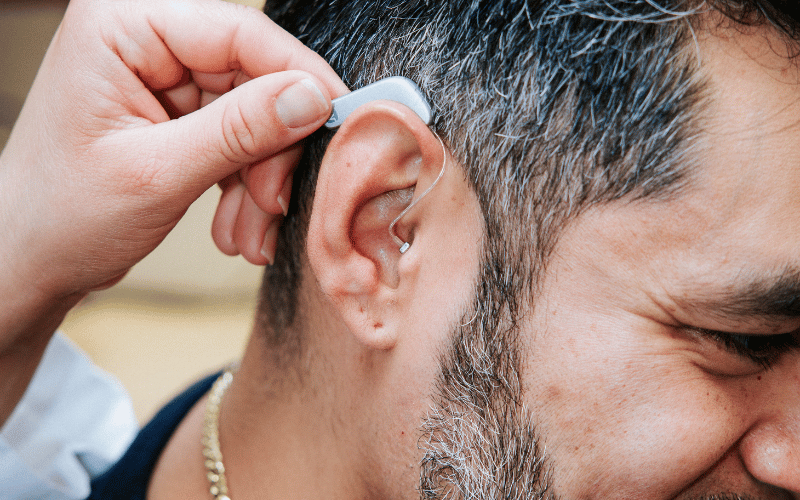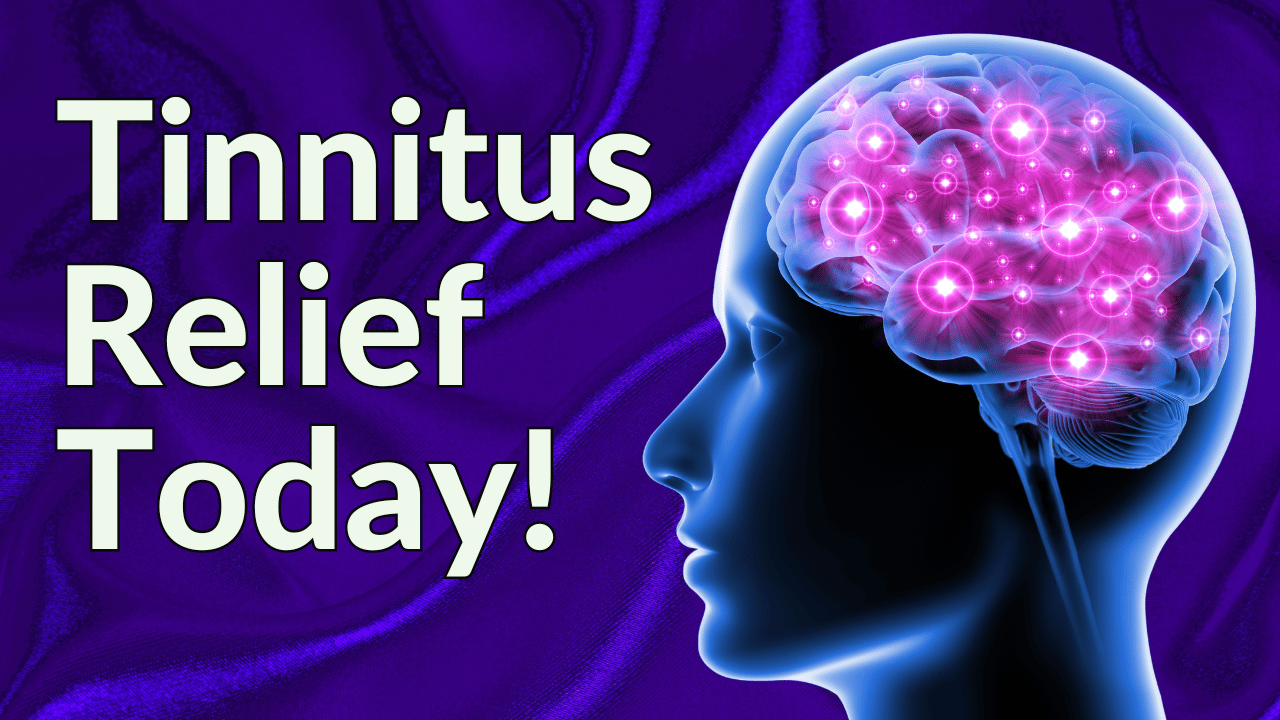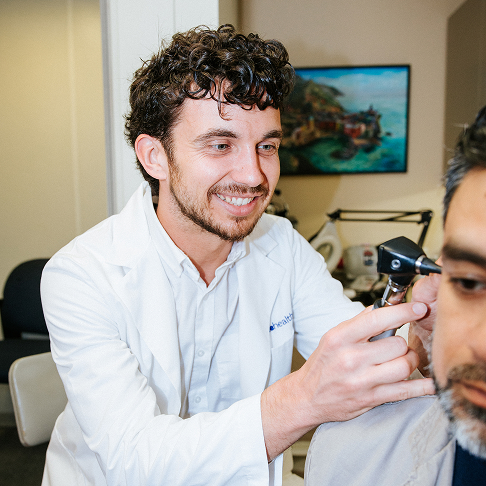Tinnitus, often described as ringing, buzzing, or hissing in the ears, affects around 10% of adults and can significantly interfere with daily life. Many people search for a cure, even asking if tinnitus medication can eliminate the condition. Today, we will explore the science behind potential cures, explore treatment options, and discuss whether learning to live with tinnitus may be a more realistic goal.
Can You Learn to Live With Tinnitus?
Yes, many people can learn to live well with tinnitus through structured strategies. Habituation isthe process of training the brain to tune out the sound. It is central to approaches like Tinnitus Retraining Therapy (TRT) and Cognitive Behavioral Therapy (CBT). These therapies aim to reduce the emotional impact of tinnitus over time.
"Treble Health helped me turn down the sound of my tinnitus. Now I can breathe, and get on with my life!"

"Treble Health helped me turn down the sound of my tinnitus. Now I can breathe, and get on with my life!"
– Elisa
Book a free consultation to learn which Treble Health solution is right for you. Join Elisa and thousands more who have found lasting tinnitus relief.
Clinical studies report that 64–84% of participants in TRT show meaningful improvement, with some studies indicating improvements in as high as 80% of people who complete the therapy! A meta-analysis published in Frontiers in Psychology also concluded that CBT is highly effective in reducing tinnitus distress and improving emotional functioning for many individuals.
Is There a Real Cure for Tinnitus?
There is currently no FDA-approved medication specifically for tinnitus. Some forms of tinnitus are reversible, such as those caused by earwax buildup, ear infections, or ototoxic drugs. Also, treating the underlying cause can stop symptoms. However, for most chronic cases related to sensorineural hearing loss, complete reversal is rare, and scientists continue to study experimental treatments.
Will My Tinnitus Ever Get Better?
That depends on the underlying cause. Tinnitus tied to earwax build-up, ear infections, or temporary medication side effects may improve once the source is addressed. However, when tinnitus stems from long-term hearing loss or neural changes, it seldom disappears. In such cases, improvement comes from symptom management and habituation techniques rather than a cure.

Is There a Way to Stop Tinnitus?
For chronic tinnitus, no quick fix or magic pill exists. Some use over-the-counter supplements, but firm evidence is limited on their effectiveness. Medications like antidepressants, anticonvulsants, or benzodiazepines may help with associated stress or insomnia but are not true tinnitus medication cures (Medical News Today). Immediate relief may occur only if tinnitus comes from acute, treatable causes like ear blockages or infection.
What Science Says About a “Cure” for Tinnitus
Despite ongoing research, there is no single FDA-approved “cure” for tinnitus that eliminates it entirely for everyone. While a bimodal neuromodulation device (Lenire) received FDA approval in March 2023 for managing tinnitus symptoms, it’s considered a treatment, not a universal cure. Experimental treatments like vagus nerve stimulation paired with sound therapy have shown promise in human clinical trials, but are not yet widely available. Drugs such as clonazepam and amitriptyline have been explored, showing inconsistent benefits in small trials and carrying risks of significant side effects. Specialists agree that managing expectations is crucial, as most effective interventions focus on symptom relief and improved coping rather than complete elimination.
Types of Tinnitus That Are Reversible
Certain tinnitus causes can be fully reversed:
- Earwax impaction or middle-ear infections: Removing obstructions or treating infections often relieves tinnitus. For instance, the American Academy of Family Physicians (AAFP) notes tinnitus as a symptom of cerumen impaction, and its removal can resolve it. Similarly, ear infections, which can cause temporary tinnitus, often see symptom improvement with treatment.
- Medication-induced tinnitus: When ototoxic drugs (medications toxic to the ear), such as certain NSAIDs or some antibiotics, are discontinued, tinnitus may diminish or resolve.
- Pulsatile tinnitus: Caused by underlying vascular issues or other specific medical conditions, this type of tinnitus can often be resolved with appropriate surgical or medical intervention once the cause is identified.
Chronic tinnitus stemming from long-term inner-ear damage or neural changes is usually not reversible, with management focusing on symptom relief.
Other Treatments Focused on Management Rather Than Cure
Since most tinnitus cases cannot be fully cured, doctors base treatment on proven management strategies:
- Sound therapy uses background noise or tinnitus maskers to minimize tinnitus perception (Tinnitus Journal).
- Hearing aids not only boost communication but also mask tinnitus and support therapy in those with hearing loss
- Lifestyle changes including stress reduction, good sleep habits, and protecting ears from noise support long-term well-being.

Habituation vs. Elimination: Understanding Your Goal
When you’re dealing with tinnitus, it’s really important to understand what a realistic and successful outcome looks like. For most people, the goal isn’t necessarily to make the tinnitus vanish completely. This is what we call elimination, and it’s quite rare, usually only happening if a very specific, underlying cause can be identified and treated.
Instead, the most achievable and sustainable goal is habituation. This involves teaching your brain to effectively “ignore” the tinnitus, making it far less intrusive and bothersome, much like how you might stop noticing constant background noise. Organizations like Tinnitus UK (formerly the British Tinnitus Association) offer excellent insights into how to “tame” tinnitus through habituation, highlighting its effectiveness. As clinicians, we often guide patients to align their treatment goals with these realities, focusing on proven, habit-based coping strategies for the majority, while reserving cure-focused approaches for those rare, identifiable reversible cases.
Why Management Beats Chasing a Cure
There is currently no definitive tinnitus medication that cures chronic tinnitus. While medical research continues toward that goal, existing therapies such as TRT, CBT, sound therapy, hearing aids, and healthy lifestyle choices offer the best outcomes. Most individuals achieve noticeable relief and lead full lives with tinnitus in the background and not at the forefront.

If you have reversible tinnitus, early diagnosis and treatment may eliminate symptoms entirely. Otherwise, the focus is best placed on managing tinnitus effectively through evidence-based strategies.
Take the First Step Toward Tinnitus Relief
Tinnitus can be challenging, but relief is possible with the right information and support. At Treble Health, we offer expert guidance based on proven strategies to help you better manage your symptoms and improve your quality of life.
If you’re ready to move forward and stop letting tinnitus take the lead, we invite you to book a free 20-minute telehealth consultation. Let’s take the first step together.
Next Step: Book Free Consultation
- 75% of patients reduced their tinnitus within three months after following our recommendations.
- "I feel like Treble Health literally gave me my life back." - Randy S. (verified customer)
- Join thousands of people who have reduced their tinnitus after scheduling a free consultation.











